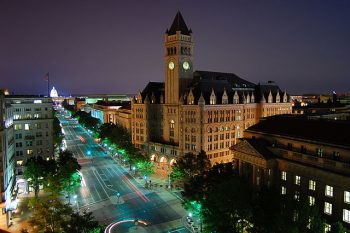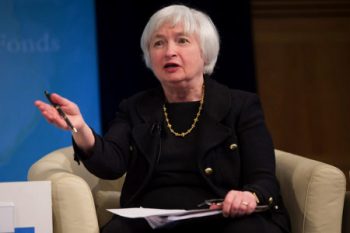By Peter Ward December 16, 2016
Trump Hotel Conflict of Interest

Trump Hotel, the former U.S. Post Office. ©By Wyn Van Devanter, CC BY-SA 2.0
Donald Trump’s business interests are causing problems in the run up to his inauguration. Buzzfeed News revealed this week that he will be in breach of a government contract unless he gives up a stake in a Washington D.C. hotel.
The Trump International Hotel is located in a taxpayer-owned building, the Old Post Office, which Trump’s company leases from the federal government. The agency in charge of the lease, the General Services Administration, has told lawmakers that it is forbidden for any elected official to hold the lease.
The news came from a letter, signed by four Democratic lawmakers, in which the lawmakers relay the GSA’s message. The letter has raised questions, not for the first time, about Trump’s possible conflicts of interest.
“The hotel, located just a few blocks from the White House, has drawn scrutiny as foreign diplomats and others interested in influencing the government stayed or planned events there in the weeks since Trump’s victory on Nov. 8. Critics say that once Trump is president, he would be able to fire the head of the GSA, effectively making him both landlord and tenant — a classic conflict of interest,” reporter Daniel Wagner writes.
Discrimination by Internet

It’s easy to discriminate by race on the Internet. ©Pixabay
How does the Internet contribute to racial inequality in the U.S.? That’s the question asked by an article published this week in Vox.
ProPublica recently published a similar story, which showed how easy it is discriminate based on race on Facebook, when reporters for the outlet bought a housing-related ad on the social media website and were able to exclude African Americans, Asian Americans and Hispanic from seeing it.
According to the Vox piece, there is an even more insidious way in which the Internet and social media may promote discrimination.
Every time users like something on Facebook or search for it on Google, these companies learn more about them, and are able to provide a more personalized experience. People from different backgrounds naturally have different preferences, and so when ads are delivered based on these personalizations, they are capable of discriminating against certain groups.
“When the nature of the discrimination comes about through personalization, it’s hard to know you’re being discriminated against,” Michael Tschantz, a Carnegie Mellon researcher, told Vox.
An example would be a real estate company selecting people that like a certain band as the target audience of their ads. If the band’s fan base is primarily white, most non-white people will not see the ad or be given an equal option to avail themselves of the real estate company’s products or services.
Fed Hike in Context

Federal Reserve Chairman Janet Yellen ©International Monetary Fund
The U.S. Federal Reserve voted to raise interest rates on Wednesday for the first time this year, and just the second time in a decade. The first hike was in December of 2015. Bloomberg published an interactive article this week attempting to show how the move compares to similar increases in the past.
Such comparisons are difficult: the data shows that economic conditions are very different versus the last time the Fed made a second rate hike in its cycle. Policy makers have little precedent that can serve as a guide.
One of the major differences is that the Fed has given the economy much more time to recover from the last recession before implementing a second hike in interest rates. The previous time the Fed made its second rate hike following a major recession, the move came in August 2004, two years and nine months after the downturn began. In the 1994 cycle, the second interest rate raise occurred three years and one month after the start of the downturn. In the current cycle, it has been seven years and six months.
Unemployment is lower now than in previous cycles, as well. So is inflation, which sits at 1.4 percent today, compared to 2.1 percent and 2.8 percent in the 1994 and 2004 cycles respectively.
Trump Tweet Risk

Trump’s Lockheed Martin tweet.
How much can one Donald Trump tweet affect the markets? Traders have discovered that it’s actually quite a lot, and have begun to take advantage-as has Trump himself.
The President-elect tweeted about Lockheed Martin on Monday at 8:30am, criticizing the company’s fighter jet program. By lunchtime that day, $4 billion had been wiped from the company’s market value. (Before Trump tweeted, he unloaded his own Lockheed Martin stock.) That’s just one example of the kind of influence Trump’s tweets have had on individual stocks.
Traders have begun monitoring the impact of the Trump tweets, so they can profit. “This is a new type of risk, call it presidential tweet risk,” Jack Ablin, chief investment officer at BMO Private Bank told Politico. “And it’s the largest companies that enjoy a global supply chain, relatively low tax rate and have marshaled Washington to their benefit that seem to be at the most risk. But everyone now has to keep their Twitter feed right next to their Bloomberg terminal.”
The trend has alerted high speed traders in particular to the opportunity. Those picking up on Trump’s tweets fast enough could bet against the companies he criticizes, and for those he praises, get in on the upswing.
Trump has millions of followers on the social media site.
This Week’s Top Headlines
U.S. senator seeks probe of Yahoo security after massive hack revealed – Dustin Volz, Reuters
FCC Chairman Tom Wheeler announces he is stepping down – Brian Fung, Washington Post
Rupert Murdoch Expands TV Empire With $14.6 Billion Sky Deal – Rebecca Penty, Eric Pfanner, Bloomberg News
Bond Rout Deepens After Fed Signals on Interest Rates – Min Zeng, Christopher Whittall, Wall Street Journal
DOT fines American Airlines $1.6M for tarmac delays – Bart Jansen, USA Today
Uber told to stop self-driving in California – BBC
U.S. Jobless Claims Fell Last Week – Josh Mitchell, Wall Street Journal
US dollar surges to 14-year high as Fed hints at three rate hikes in 2017 – Martin Farrer, The Guardian
Verizon Explores Lower Price or Even Exit From Yahoo Deal – Scott Moritz, Brian Womack, Bloomberg
The oil and gas industry is quickly amassing power in Trump’s Washington – Juliet Eilperin, Steven Mufson and Philip Rucker, Washington Post
This entry was posted on Friday, December 16th, 2016 at 5:30 pm. It is filed under Week in Review. You can follow any responses to this entry through the RSS 2.0 feed.
Comments are closed.
